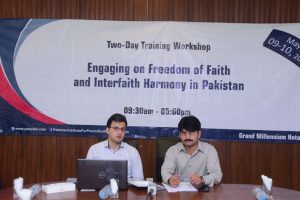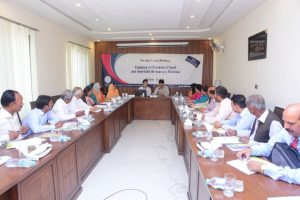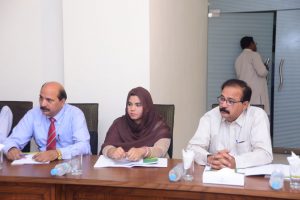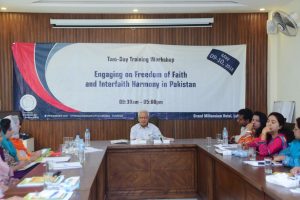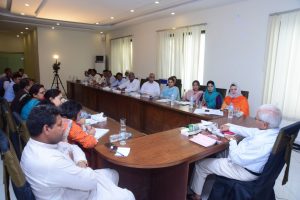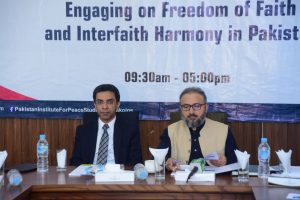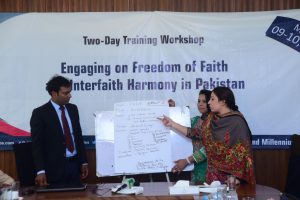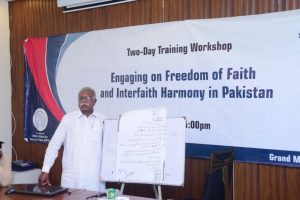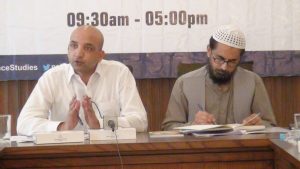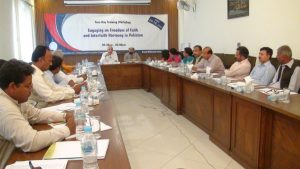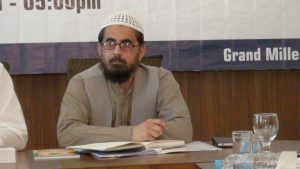Third workshop on Interfaith Harmony concludes in Lahore
Pak Institute for Peace Studies (PIPS) engaged 30 participants from Punjab as well as Azad Kashmir in the third of a series of workshop on interfaith harmony. Held on May 9-10, 2018, the workshop “Engaging on freedom of faith and inter-faith harmony in Pakistan” was designed to explore ways of working for the promotion of faith-based harmony in Pakistan. Participants comprised of civil society representatives working on minority rights or interfaith harmony.
 PIPS’s senior project manager Muhammad Ismail Khan and events coordinator Nawaf Khan thanked the participants and shared the rationale of the engagement. It was underlined that the purpose was to explore how to promote interfaith harmony in Pakistan.
PIPS’s senior project manager Muhammad Ismail Khan and events coordinator Nawaf Khan thanked the participants and shared the rationale of the engagement. It was underlined that the purpose was to explore how to promote interfaith harmony in Pakistan.
After introductory remarks, Ismail Khan shared the broader findings of the study of working on interfaith issues in Pakistan. The study found that non-Muslims in Pakistan unanimously agree that they are under-reported. Many of them also lack proper identity cards, exposing them to all sorts of vulnerabilities. It was suggested that the religious-wise distribution of the census performed in 2017 be publicized. Without that, all sorts of speculation germinate, which is not beneficial for the society.
Ismail also commented that the problems faced by minorities owe as much to lack of implementing laws, as to legal lacuna. It is because of legal loopholes that non-Muslims are also exposed to all sorts of vulnerabilities
 Senior lawyer Saroop Ejaz pointed to the multiple causes of discrimination against religious minorities. One cause is lack of implementation of constitutional provisions that accord non-Muslims certain rights. He advised civil society to follow up on the 2014 Jassaduq Jillani judgment, which called for giving non-Muslims their rights.
Senior lawyer Saroop Ejaz pointed to the multiple causes of discrimination against religious minorities. One cause is lack of implementation of constitutional provisions that accord non-Muslims certain rights. He advised civil society to follow up on the 2014 Jassaduq Jillani judgment, which called for giving non-Muslims their rights.
Another cause, he hinted, emanates from the society. A lot of the times, people resort to mob violence against entire communities, taking law in their own hand. Finally, a decisive factor has been played by the state. The state, he said, has not being a neutral role in religious issues. This siding with one against the other has spawned all sorts of extremist tendencies that went unchecked. It was only recently that some course correction is in the offing in the wake of National Action Plan, he said.
 Scholar Ammar Khan Nasir discussed the role of religious scholars in promoting peace. Meanwhile, religious scholar Amanat Rasool said that all religions promote peace and harmony; the problem, he said, is not with any particular religion but with people, no matter which religion. Lawyer Ali Raza underlined the need for engaging youth in interfaith activities.
Scholar Ammar Khan Nasir discussed the role of religious scholars in promoting peace. Meanwhile, religious scholar Amanat Rasool said that all religions promote peace and harmony; the problem, he said, is not with any particular religion but with people, no matter which religion. Lawyer Ali Raza underlined the need for engaging youth in interfaith activities.
Participants were also asked to suggest concrete steps towards harmony. They said that enabling environment be provided where people of diverse faith interact with each other. Sports too provide such environment. They also called for forming a group that advocates for the rights of vulnerable groups. Additionally, it was suggested that a range of people in the society should be sensitized on the need for peace and tolerance in the country.
Gallery:


